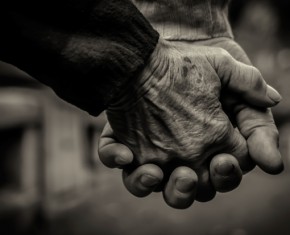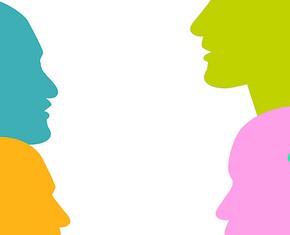The views expressed in our content reflect individual perspectives and do not represent the authoritative views of the Baha'i Faith.
For small creatures such as we, the vastness is bearable only through love. – Carl Sagan.
Wherefore, O friend, give up thy self that thou mayest find the Peerless One, pass by this mortal earth that thou mayest seek a home in the nest of heaven. Be as naught, if thou wouldst kindle the fire of being and be fit for the pathway of love. – Baha’u’llah, The Seven Valleys, p. 9.
Love is our strongest emotion, our deepest possible human feeling. If you’ve ever fallen truly, passionately and profoundly in love, you know that the fire of the valley of love has the power to burn away reason and knowledge. Here on the spiritual path, in the valley of love, seekers begin to see and understand the inner beauty of their kind–humankind–and their Creator. As the path moves into a realm of love for Creator and creation that goes beyond words and limitations, the seeker’s strengthened and expanded heart extends itself out into new territory.
In The Four Valleys Baha’u’llah quotes Rumi’s mystical epic poem The Mathnavi and its metaphor of romantic love to describe this awakening love for the creation–“The lover’s teacher is the Loved One’s beauty, His face their lesson and their only book.” At this stage of the seeker’s evolutionary progress along the path, the soul begins to acquire the capacities and new spiritual perceptions necessary to move beyond the material world and “look on all things with the eye of oneness.” – Qur’an 18:37.
The passion this plane engenders needs to find a method of expression–just as a painter must paint and a musician must play, the seeker who discovers the mystical Beloved must pour out that love in return.
Not everyone, though, has well-developed loving abilities. Because the family serves as the cradle of individual development, we typically learn our affection and fellowship skills from our mother and father, and subsequently our brothers and sisters. When either parent has problems with those attributes, the family becomes dysfunctional, and fails to transmit learning about how to give and receive affection and fellowship:
The loving capacity includes not only the ability to love but also the ability to be loved–to attract love. We cannot have lovers without loved ones. If we do not know how to be loved or cannot accept it, then we frustrate others who are struggling to develop their capacity to love. Not accepting someone’s love is very frequently experienced as rejection and does untold amounts of damage, particularly in young children. – Dr. Daniel C. Jordan, Finding Your True Self, World Order Magazine, p. 45.
Many families fall short in these essential life skills. Because we learn love from our families, mistakes and deficiencies in anyone’s capacity to love and create relationships invariably get passed on to the next generation and the next. One of the great gifts a spiritual quest offers is the ability to break those dysfunctional patterns. This new knowledge, just one of the powerful outcomes of search, lets the seeker transcend not just the self, but the familial and learned dysfunctions we all inherit.
In the valley of love, the seeker comes to a stage that Maslow and others praised as one of the ultimate destinations on the seeker’s path–other-directedness.

When we truly love another person, we naturally wish for their happiness, and we usually do whatever we can to make them happy. When we truly love many other people–even humanity itself–we gradually de-emphasize and then transcend our own individual needs and desires, and replace them with a genuine, loving desire to realize the unity, peace and happiness of all. Arranging and directing our lives for the benefit of others means that the seeker has started to move beyond the insistent self.
At this maturational stage the self, as Rollo May puts it, becomes fulfilled: “To be capable of giving and receiving mature love is as sound a criterion as we have for the fulfilled personality.” – Man’s Search for Himself, p. 238.
The free giving and getting of unselfish love, more than anything else, makes for progress in this valley. True seekers experience universal love, and long to become a pure channel, a hollow reed blown free of the pith of self, so they become able to transmit that love to others. The selfless, loving, altruistic giving of mutual care and compassion and kindness to others endlessly re-generates itself, and thereby creates its own continuous loop of love, both love given and love received.
We learn at this stage that yin and yang, the loving capacity and the capacity to attract love, each bolster and complement each other. When these capacities grow, flourish and start to function well, we can become magnets of love, compelling lodestones of the human spirit that effortlessly and authentically attract the love of others. At this stage of maturation and spiritual development, words become much less important than deeds. Actions that express love for others take precedence, and the beauty of those actions reflects the reality of a loving Creator.
Completely independent of physical attractiveness or charisma or charm or fame or force of personality or the power of a highly developed intellect, this attracting attribute of selfless love emanates from a radiant inner quality of lightness, openness and loving-kindness–which ultimately comes from a supreme source:
The denizens of this plane speak no words — but they gallop their chargers. They see but the inner reality of the Beloved. – Baha’u’llah, The Four Valleys, p. 55.
Next: Loving the Universe and Everyone In It
















Comments
Sign in or create an account
Continue with Googleor